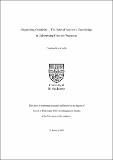Files in this item
Organizing creativity : the role of aesthetic knowledge in advertising creative processes
Item metadata
| dc.contributor.advisor | Hibbert, Paul | |
| dc.contributor.advisor | Greig, Gail Jane | |
| dc.contributor.author | Grahle, Christian René | |
| dc.coverage.spatial | xi, 289 p. | en_US |
| dc.date.accessioned | 2017-10-17T14:32:21Z | |
| dc.date.available | 2017-10-17T14:32:21Z | |
| dc.date.issued | 2015-01 | |
| dc.identifier.uri | https://hdl.handle.net/10023/11868 | |
| dc.description.abstract | This thesis presents the results of research which investigated how creative processes in advertising agencies are organized and the role aesthetic understandings play therein. In-depth accounts describing how creative processes in advertising agencies are organized were not well characterized in the extant literature. This was surprising, given the confusion that existed about whether or not advertising practitioners share similar tastes. Whereas some research suggests highly homogenous taste patterns, other research, reporting about severe conflicts in advertising agencies, suggests that the contrary is true. Consequently, also research on taste-making processes and thus the ways through which tastes and collective action are negotiated was missing. This research aims to address these gaps in the literature by providing an in-depth account of the way specific practices creative processes are organized by analysing how practices and tastes interlink as well as by providing insights into the ways through which taste and collective action are sustained at advertising agencies. To do so, qualitative research at a leading London-based advertising agency was carried out over a period of five months. Two sets of practices by which the advertising creative processes were organized were identified. In addition, four types of tensions between both sets of practices and thus different tastes among advertising practitioners, depending on the practices in which they were immersed, were found. Moreover, ways in which tensions were resolved and thus how different tastes were negotiated were identified. By doing so, this research closes the above gaps in the literature and reveals that at advertising agencies’ creative processes and taste-making go hand in hand. Finally, practical insights for managers in the advertising industries, aiming to foster collective engagement, collaboration and conversations, and creative expression in creative advertising processes as well as suggestions for future research are offered. | en_US |
| dc.language.iso | en | en_US |
| dc.publisher | University of St Andrews | |
| dc.subject.lcc | HF5821.G72 | |
| dc.subject.lcsh | Advertising agencies | en |
| dc.subject.lcsh | Creative ability in business | en |
| dc.subject.lcsh | Commercial ar | en |
| dc.subject.lcsh | Advertising--Research | en |
| dc.title | Organizing creativity : the role of aesthetic knowledge in advertising creative processes | en_US |
| dc.type | Thesis | en_US |
| dc.contributor.sponsor | University of St Andrews | en_US |
| dc.contributor.sponsor | HORIZONT-Foundation | en_US |
| dc.contributor.sponsor | Thomas and Margaret Roddan Trust | en_US |
| dc.contributor.sponsor | Scottish Graduate School of Social Science (SGSSS) | en_US |
| dc.type.qualificationlevel | Doctoral | en_US |
| dc.type.qualificationname | PhD Doctor of Philosophy | en_US |
| dc.publisher.institution | The University of St Andrews | en_US |
This item appears in the following Collection(s)
Items in the St Andrews Research Repository are protected by copyright, with all rights reserved, unless otherwise indicated.

